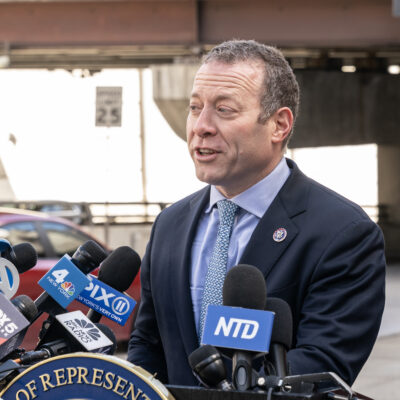Ilhan Omar’s daughter suspended from Columbia’s sister school following congressional questioning
The Minnesota congresswoman repeatedly downplayed violations by anti-Israel protesters and accused the school of unfairly targeting pro-Palestinian activists

Alex Wong/Getty Images
Rep. Ilhan Omar (D-MN) speaks during a news conference
Rep. Ilhan Omar’s (D-MN) daughter was suspended from Barnard College on Thursday morning over her involvement in an anti-Israel protest on Columbia University’s campus, a day after Omar questioned Columbia’s president at a House Education and Workforce Committee hearing.
During her questioning, Omar repeatedly downplayed violations by anti-Israel protesters on campus and accused the school of unfairly and baselessly targeting pro-Palestinian activists. Omar did not mention her daughter’s leadership in a suspended campus anti-Israel group during the hearing.
Barnard is technically independent from Columbia but functions as an affiliate of the Ivy League school; Barnard students have full access to Columbia facilities and courses, with students receiving a diploma from both schools.
Omar’s daughter, Isra Hirsi, who maintains a robust public profile of her own, posted on X on Thursday morning that she and two other students were “suspended for standing in solidarity with Palestinians facing a genocide,” adding that she’s part of the “Gaza Solidarity Encampment,” an unauthorized tent camp set up on the Columbia campus by anti-Israel activists in violation of the school’s rules and warnings provided by school officials.
On Thursday afternoon, New York Police Department officers entered the encampment and began arresting demonstrators who refused to disperse.
Hirsi also described herself as an organizer with Columbia Students for Justice in Palestine, which was suspended on Columbia’s campus but has continued its activities.
In her questioning of Columbia President Nemat Shafik, Omar said she was “appalled” that Columbia suspended and expelled six students from school housing “for their involvement in the pro-Palestinian panel event on campus,” claiming that the students were “arbitrarily targeted” and that Palestinian students were “harassed [and] intimidated” by private investigators.
The panel Omar referred to included an individual linked to a U.S.-designated terrorist organization, and Columbia leaders said on Thursday had contacted the FBI about the event.
“This was a very serious case. We had students who on an online call invited people who were inciting violence,” Shafik said. “And that is unacceptable. And so we needed to get to the bottom of it.”
Shafik said the students refused to cooperate with the investigation and will remain suspended until they do so.
Omar further claimed that pro-Palestinian protesters at Columbia had been “attacked with a toxic chemical substance leaving many hospitalized.” She claimed that Columbia administration had failed to contact the students impacted for several days.
Shafik responded that police are investigating, and that the school did contact all of the students affected and “many of them didn’t want support,” and rejected Omar’s accusations that the school had not responded immediately.
Further, Rep. Virginia Foxx (R-NC), the education committee chair, said at the close of the hearing that, based on documents provided by the school, the students in question had been sprayed with a non-toxic prank item, and that the students who sprayed it are suspended.
Omar also questioned how many of the organizations that had been “canceled” by the school included Jewish students. SJP and Jewish Voice for Peace were suspended by the school for violations of its policies.
More broadly, Omar claimed that “there has been a rise in targeting and harassment against anti-war protesters” at schools around the country, further claiming that there “has been a recent attack on the democratic rights of students across the country.”
The Minnesotan legislator asked Shafik whether there had been any protests on Columbia’s campus “saying we are against Jewish people,” to which Shafik responded “no,” after some hesitation. Shafik attempted to elaborate on that answer, before being cut off by Omar.
Later in the hearing, Shafik agreed with other Columbia officials that some of the protests included content that was “completely anti-Jewish, completely unacceptable, horrible.”
During a break in the hearing, Omar delivered remarks to the press alongside a group of pro-Palestinian protesters who said they were Columbia students, and had spent much of the early part of the hearing shouting in the hallway outside the hearing room demanding to be let in, at times making it difficult to hear those speaking inside the room.
“This is not an honest conversation that we’re having today in this committee,” Omar declared, again repeating claims about “toxic chemical attacks” and accusing Columbia of creating “oppressive systems” to silence protesters.
She said it is a “disservice to our democracy” that the protesters were not allowed into the hearing room, which was full for almost the entire event.
Omar did not immediately respond to a request for comment.
Rep. Jamaal Bowman (D-NY), who also participated in the hearing and the press appearance, implied in a post on X that Hirsi was being suspended in retaliation for Omar’s questioning, calling it a “political [reprisal].”
Rep. Rashida Tlaib (D-MI) responded to Hirsi’s post, claiming that students “are being retaliated against for using their constitutional rights to protest genocide. It’s appalling.”









